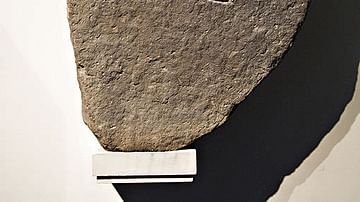Search
Search Results

Definition
Edward the Confessor
Edward the Confessor, also known as Saint Edward the Confessor, reigned as king of England from 1042 to 1066 CE. Edward was reliant on the powerful Godwine (aka Godwin) family to keep his kingdom together but his achievements included a relatively...

Definition
William Shakespeare - The Bard
William Shakespeare (1564-1616) was an English poet, playwright, and actor who flourished during the late Elizabethan and early Jacobean eras. Known as the 'Bard of Avon,' he wrote 38 plays, 154 sonnets, and three longer narrative poems...

Definition
Saint Margaret of Scotland
Saint Margaret of Scotland (c. 1046-1093 CE) was, as the second wife of Malcolm III (r. 1058-1093 CE), the queen of Scotland from 1070 CE until her death in November 1093 CE. A princess of the royal house of Wessex, she brought Anglo-Saxon...

Definition
Richard Strauss
Richard Strauss (1864-1949) was a German conductor and composer of both innovative late-Romantic and Modernist music. He is best known for his symphonic poems and operas like Salome and Elektra, both of which caused a sensation. Strauss gained...

Definition
Thomas Middleton - Master of Jacobean Comedy and Tragedy
Thomas Middleton (1580-1627) was a poet and playwright of the English Renaissance, who flourished during the Jacobean Era (1603-1625). One of the most successful dramatists of his time, he often collaborated with other playwrights, including...

Collection
Scottish Medieval Monarchs
In this collection, we present the 15 most important of the 21 monarchs to rule Scotland from the 11th to 16th century. For the first time forging a unified kingdom, the monarchs of this period were often warrior-kings who conquered the remoter...

Definition
Picts
The Picts were a people of northern Scotland who are defined as a "confederation of tribal units whose political motivations derived from a need to ally against common enemies" (McHardy, 176). They were not a single tribe, nor necessarily...

Definition
Stone of Scone
The Stone of Scone (Gaelic: Lia Fail), also known as the Stone of Destiny or Coronation Stone, is a block of sandstone associated with the coronation ceremonies of the medieval monarchs of Scotland. These ceremonies were held at Scone, a...

Definition
James I of England
James I of England (r. 1603-1625), who was also James VI of Scotland (r. 1567-1625), was the son of Mary, Queen of Scots, and he unified the thrones of Scotland and England following the death of Queen Elizabeth I of England (r. 1558-1603...

Definition
Queen Anne's War - When Europe's Succession Dispute Ignited American Frontiers
Queen Anne’s War (1702-1713) was the second major colonial conflict in North America, fought between the colonies of England – Great Britain after 1707 – and those of France and Spain, each side aided by their respective Native American allies...